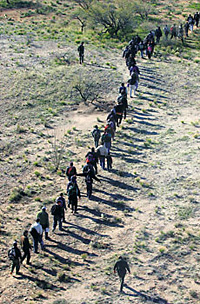 |
 |
 |
 News from Around the Americas | May 2007 News from Around the Americas | May 2007  
Smuggling Ring Ends with Prison
 Mike Tobin - The Plain Dealer Mike Tobin - The Plain Dealer


| | Guides known as "coyotes" led the immigrants across the border into the United States through large drainage ditches or desolate stretches of desert. |
Hundreds of Mexicans desperate to work in Northeast Ohio's nurseries and restaurants paid $2,000 to be led through drainage ditches and packed into vans in Arizona that drove nearly nonstop before dropping them in Painesville, Lorain and Ashtabula.

That pipeline closed Tuesday with the sentencing of its leader, Manuel Valdez-Gomez, to a decade in prison.

Valdez-Gomez, 56, established the network that brought hundreds of illegal immigrants to the area for nearly a decade and made him more than $1 million.

Most of his customers were from Leon, the Mexican city many immigrants in Northeast Ohio originally came from, Assistant U.S. Attorney Phillip Tripi said.

Mexicans who wanted to come to Northeast Ohio made their way to Nogales, Mexico, where Valdez-Gomez owned part of a restaurant and hotel that he bought with profits from the human smuggling, Tripi said.

From the hotel, guides known as "coyotes" led the immigrants across the border into the United States through large drainage ditches or desolate stretches of desert, prosecutors said.

Once in the United States, the immigrants packed into vans, sometimes with as many as 14 people per vehicle.

From Arizona, the drivers headed north, to states including Utah, Colorado and Wyoming, before heading east, prosecutors said.

That was done to avoid southern routes where police are on the lookout for illegal immigrants. They tended to drive through the night, but sometimes made stops at safe houses Valdez-Gomez used, including one on Heyer Street in Painesville.

Valdez-Gomez's two major drop-off areas were Northeast Ohio and around Grand Rapids, Mich., where he once lived.

"Clearly, he had regular business going through here," Tripi said.

The immigrants were met by friends or family, who paid about $2,000 to associates in Valdez-Gomez's network. Those people then wired money back to Valdez-Gomez in Nogales, Ariz., where he lived as a legal immigrant and owned commercial properties and an auto repair shop.

The immigrants could pay extra for fraudulent documents such as Social Security cards to use to find jobs. They often worked in nurseries, restaurants and small manufacturing companies in the area.

"Even with the $2,000 fee, they still earned enough to send back to Mexico so that it made it worth their while," Tripi said.

The investigation started in 2004, when several illegal immigrants implicated Valdez-Gomez after being arrested in Painesville.

He was arrested last year and pleaded guilty in January to 10 counts, including conspiracy, wire fraud and money laundering.

"I would like to apologize for everything I did," Valdez-Gomez said in U.S. District Court through an interpreter. "I would like to thank the United States, because this is where I learned all the businesses I've been involved in."

He could face deportation when he's released from prison, Tripi said.

Altogether, 22 people have pleaded guilty for their roles in the ring, including two Painesville residents.

Isaias Garcia-Hernandez, 41, was sentenced to 18 months in prison for his role in wiring money to Valdez-Gomez. Guadalupe Hernandez, 52, was sentenced to two years in prison for operating the safe house on Heyer Street.

U.S. District Judge Solomon Oliver said he understood why people want to come to the United States, but chastised Valdez-Gomez.

"There's no question why people would rather be here than in Mexico, and he made some money off that," Oliver said. "I understand people's dreams to be here, but you have to do that legally." | 
 | |
 |



